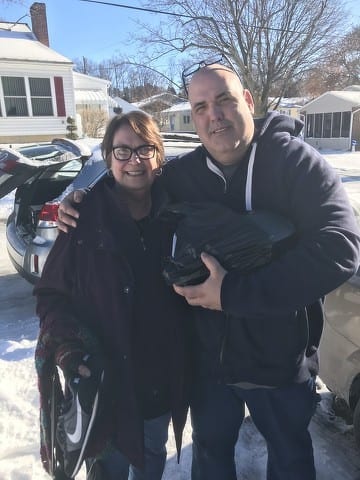Until November of last year, individuals adopted as children in Pennsylvania had little to no access to verifiable information about their birth mothers or families.
‘I spent years searching off and on,’ said adoptee Daniel Frank, of Phillipsburg, ‘It felt like a roller coaster. I’d make some progress, then I’d hit a low point and quit searching.’
Born in Erie in 1967 and adopted at 6 months of age, Frank exhausted every avenue in his quest to discover his personal origin.
‘My adoptive family was great,’ he said, ‘but that wasn’t even the point. Something inside was not fulfilled.’
Frank realized he was adopted when, as a 12-year-old, he had a conversation with a classmate. ‘She said I was ‘special’ like her,’ he said, and his adoptive mother confirmed what “special” meant.
A few years later, he began to search. He bought a search manual, scoured courthouse records and repeatedly questioned his birth location, St. Vincent’s Hospital, as well as Catholic Charities. But, none of his inquiries led to any concrete information.
Then, in 2015, state Rep. Kerry Benninghoff, R-Bellefonte, drafted legislation that would unseal the state’s adoption records, kept totally confidential since 1984. In November 2016, Gov. Tom Wolf signed Act 127, which makes birth certificates available to any person born within the state.The State Department of Health began releasing the certificates a year later.
The act does include language allowing a birth parent to keep his or her identity confidential and/or to request no contact. However, it allows adoptees information about possibly inherited medical issues.
In Frank’s case, he did locate his birth mother. He received the certificate, including her name, on Nov. 12. The next day, he shared the discovery with his daughter, who did a Facebook search and located Phyllis Cooper. The Ohio woman had given birth to Frank 50 years earlier.
Both Frank and his daughter messaged Cooper. They got no response until Nov. 23.
‘My world caved in,’ said Cooper, whose 47-year-old daughter who knew nothing about Frank’s existence.
Cooper, who had kept silent about the birth, now had to explain to her daughter how she had a son and had given him up for adoption so long ago.
‘She’s really very happy,’ Cooper said. ‘She always wanted a sibling.’
Cooper and Frank met, and the two have spent some time reconnecting and adjusting their lives to accommodate each other’s feelings and experiences.
‘It’s all in the blending and the working,’ Cooper said during a recent visit. ‘Daniel and I are working to make this work. He always says that failure is not an option’
The process went smoothly and efficiently for Frank and Cooper. But, sometimes, even with the new legislation, seekers can hit obstacles. At that point, they can turn to a ‘search angel’ such as Priscilla Stone Sharp, of State College. Sharp has facilitated more than 1,000 reunions between adoptees and birth parents. The State College resident surrendered a daughter to adoption in 1964. The two reunited in 1986.
Using public records, Sharp said her mission ‘was nearly impossible until last year.’
But even the passage of Benninghoff’s bill hasn’t made it so easy for a lot of people.
‘You still have people who redact their name or who used a fake name when they gave birth,’ she said.
Part genealogist, part historian and part sleuth, Sharp offers her services free of charge and estimates that she helps at least five people each week find their blood relatives.
‘I use the DNA service on Ancestry.com,’ she said, ‘and I nearly always find some sort of relative that way.’
From there, she does more research until something breaks. A strong adoptive rights advocate, Sharp receives requests through her website, priscillasharp.blogspot.com, and through her Facebook page.
‘I worked on one case for 12 years,’ she said. ‘I found the father, using DNA, and, eventually, the 89-year-old mother.’
Again, family medical information, along with true ethnicity, makes these searches so important.
Frank, however, does advise adoptees to make sure they understand their motivation for their search.
‘Is it just out of curiosity that you want to find the birth mother? Or, do you really want to form a connection? Because, you have to be prepared for whether or not the birth mother wants a connection,’ said Frank.
Frank and Cooper both expressed gratitude to Benninghoff for removing the roadblocks.
‘It’s the best thing that could have happened,’ Cooper said.



